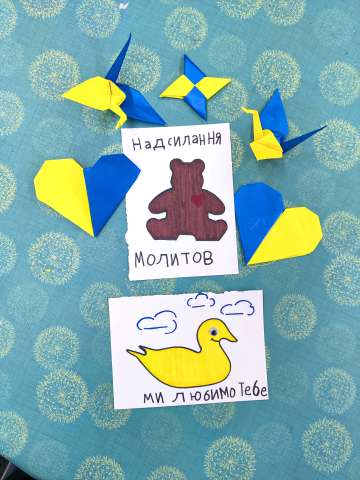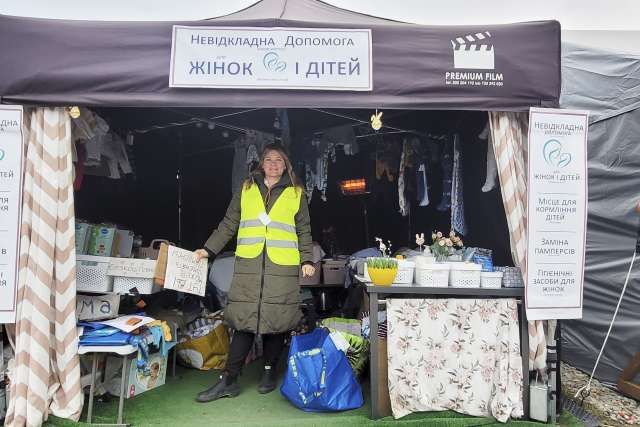I WAS ON A SABBATICAL IN LONDON WHEN RUSSIA INVADED UKRAINE in February. Four days later, I was a volunteer behind the wheel of a van in a convoy of seven vehicles driving 20 hours to deliver relief supplies for refugees on the Poland-Ukraine border.
I’ve been here ever since.
As my companions and I covered the nearly 1,900 kilometers to our destination, we wondered what we might encounter when we arrived. Would we see people who had been shot or injured by bombs? Children with burned or crushed limbs? We had no idea what to expect.
It was scary, but at the same time, I felt grateful to be doing something to try to help.
We arrived in the very early morning and unloaded our supplies at a warehouse. Someone then took us to the border crossing to see what was happening there. It was at least -10 degrees Celsius out, and people came up to our van window asking if they could sit inside to warm up. They were waiting for transportation to somewhere else — maybe in Poland, maybe in Germany or some other country — but nothing was moving, and they were freezing. And already there were human traffickers there, taking advantage of the situation and making victims out of victims.
“Yes, get in. Please come in,” we said to the ones who wanted to get warm. I felt desperate to help.
We drove back to London, escorting a Ukrainian woman, Mariana, and her daughter. They had fled their city, which was under siege, and had to leave their grandmother behind. It was COURTESY OF CHRISTIE J. NELSON horrible for them; they were traumatized and in shock.
I knew there was more that I could do. A few days after we returned, I got on a plane and flew back to Poland, where I set up a women’s and children’s center — little more than a small, trash-strewn tent that I commandeered from men working at the refugee center who wanted to turn it into a tea booth — at the border crossing near the village of Medyka.
In those early months, it was bitterly cold, and the line of refugees waiting to cross into Poland could stretch for two kilometers or more. It took days to get through. The route was littered with garbage. There were no bathrooms. Nearly everyone in that line was a woman or child. They carried what few possessions they could manage and slept outside in the wind and rain. And once they did cross, mothers often came to us with babies who were wet and chilled to the bone, nearly hypothermic. We brought them into the warm tent and gave them new, dry clothes, and provided the women with feminine-hygiene supplies.
It is mostly men working in the refugee center, but it’s important for the women and children to see the smiling face of a female, someone who understands their needs and problems. I say to them, as best I can, in Ukrainian, “laskavo prosymo,” “welcome,” and try to make them feel comfortable. They are exhausted, and shy. I don’t allow men into my women’s tent.
The women are so grateful. So many hugs. For me, it feels close to a spiritual experience.
These women, my sisters, and children crossed the border fleeing in terror from bombs and gunfire and death in their towns and cities. Most left the adult and near-adult males in their families behind, many of them to engage, and perhaps die, in the fight against the Russians. Tears filled the eyes of many — tears of fear and tears of uncertainty for what lay ahead. I continue to be impressed by their resilience.
Sometimes the older women, the grandmothers, come and sit and talk with me. They’ve seen so much in their lives. The grandmas melt my heart. Though I’ve picked up some Ukrainian, I use a digital translator to communicate with them. They’ll talk about things that are jovial and sweet, but then switch to the bitter truths of their new reality. “My beautiful city, it is destroyed,” they will say. “My town is now rubble.” It is so difficult hearing their stories. I try to imagine what it would be like if it were my town or my city — if it were Westwood that had been bombed and destroyed. I can’t.
The days are very long, sometimes 18 hours or more, but the support I have received from my colleagues at UCLA, as well as family and friends, has been very gratifying. They send money to buy diapers and other supplies, and they offer encouragement.
One day a girl, maybe 10 or 11 years old, who was with her father, an American volunteer, handed me an envelope and said, “My class did a play about the Holocaust as a fundraiser, and I want you to take this money for your project.” There was about $600. This is sacred money, I thought, a pure act of giving. I used it to buy sandals and summer clothes for the children.

Over the months, the scope of my work has expanded. I’m no longer tethered to the border and have now crossed into Ukraine numerous times to deliver supplies to hospitals as far away as Lviv, a battered city about 90 kilometers east where basement windows are blocked over with sandbags, turning them into makeshift bomb shelters.
My head reels from many of the things I’ve seen. Being here is so different from anything I’ve done before, and the experience has changed me. Things that once seemed important don’t anymore, and other things that were unimportant in the past now have new meaning. I love what I am doing here. I want to help and make some kind of contribution, and I will stay for as long as it takes.
